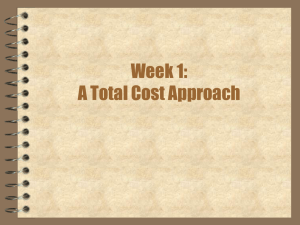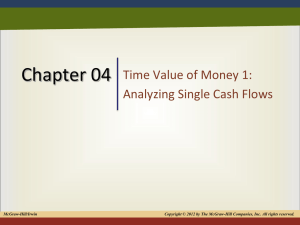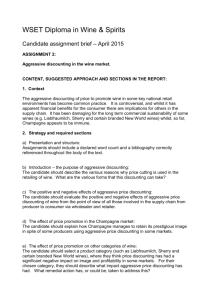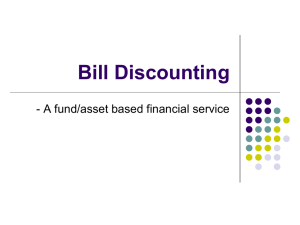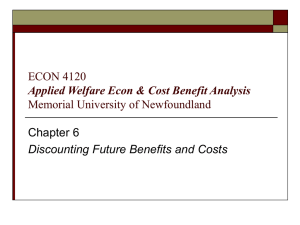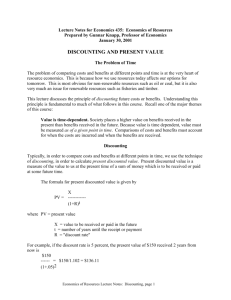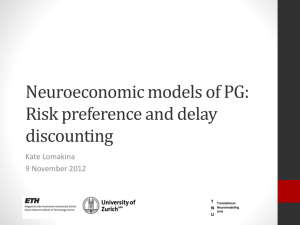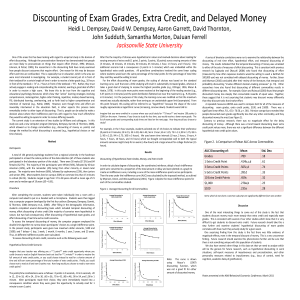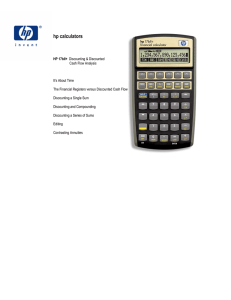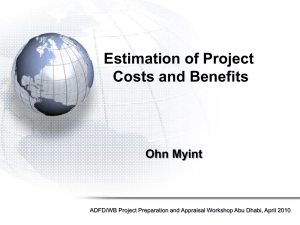Document
advertisement
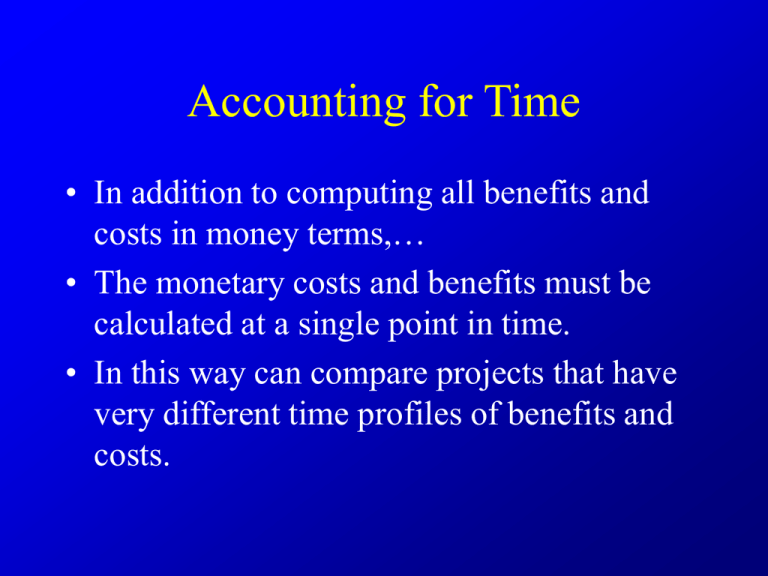
Accounting for Time • In addition to computing all benefits and costs in money terms,… • The monetary costs and benefits must be calculated at a single point in time. • In this way can compare projects that have very different time profiles of benefits and costs. Compounding • Interest rate is applied to periodically (every year) – to both principal and earned interest • Year 0: 100 – ( x 1.08 – multiplication factor for 8% interest rate) • Year 1: 108 – ( x 1.08) • Year 2: 116.64 – ( x 1.08) • Year 3: 125.97 – etc Compounding • Future Value (FV) of X in time period t = X ∙ (1+r)t • The value in time t of $1 invested today (time 0). • Compounding Factor: (1+r)t (Spreadsheet Example) Discounting (Opposite of Compounding) • Present Value (PV) of = Xt received in time period t = 1/(1+r)t ∙Xn • Amount of money needed to invest today to obtain Xt in time t • Discounting Factor (1/(1+r)t) (Spreadsheet example) Discounting • At 8% interest rate, $125.97 in year 3 is equivalent to having 100 in year 0. – If I invested $100 today, I would have $125.97 three years from now. – By discounting we are including the opportunity cost of capital. • If the discounted net benefits of a project are positive, the return on this investment are greater than the market rate of interest Discounting YR Costs Benefits Net Discount Factora 1 100 0 -100 .926 -92.59 2 0 109 109 .857 93.45 Total 100 109 9 aDiscount at 8% PV 0.86 Discounting • Discounting permits comparison of projects with different profiles of costs and benefits Flow of Costs and Benefits Option 1 Option 2 YR Cost Benefit Net Benefit Cost Benefit Net Benefit 0 100 0 -100 40 50 10 1 10 0 -10 40 50 10 2 10 150 140 40 50 10 Sum 120 150 30 120 150 30 Discounting Option 1 YR Net Benefits Compound factora Discount Factora PV Net Benefits 0 -100 1.000 1.000 -100 1 -10 1.080 .9259 -9.26 2 140 1.1664 .8573 120.02 Total 30 aDiscount at 8% 10.76 Discounting Option 2 YR Net Benefits Compound factora Discount Factora PV Net Benefits 0 10 1.000 1.000 10.00 1 10 1.080 .9259 9.26 2 10 1.1664 .8573 8.57 Total 30 aDiscount at 8% 27.83 Issues in Discounting • Real versus nominal prices and interest rate – See Boardman et al. pp. 135-140 • Projects with different time horizons – See Boardman et al. pp. 133-134 Real vs Nominal Values • Inflation rate = i • CPI1 = CPI0 * (1+i) • Real price (in time 0 prices) of price X1 in time 1 is: X1 * (CPI0/CPI1) = X1 * (1/(1+i) Real vs Nominal Values • So if invest $X today at an interest rate of 8% (r = 0.08) and inflation rate is 5% (i = 0.05): FVreal = X * (1+r)/(1+i) = (1.08/1.05) 1.03 • So, the real interest rate = (1+r)/(1+i) (1+(r-i)) Real vs Nominal Values • In CBA calculations, may project costs and benefits in nominal or real terms, but need to be consistent with interest rate: – If use nominal prices, need to use nominal interest rate – If use real prices, need to use real interest rate Different Time Horizons Consider two options: 1. Hydroelectric dam • • 75 year life NPV = $30 million 2. Cogeneration project • • 15 year life NPV = 24 million Choose Hydroelectric because higher NPV? • But could have 5 consecutive cogeneration projects over the life of the hydroelectric dam Different Time Horizons NPV(5xCP) = 24 + 24*(1.08)15 + 24*(1.08)30 + 24*(1.08)45 + 24*(1.08)60 =34.94 million • See spreadsheet example Different Time Horizons • Need to put on equal time horizon: • Equivalent Annual Net Benefit (EANB): – NPV / Annuity Factor – Gives the amount which, if received every year for the life of the project, would have the same NPV as the project. Different Time Horizons • 1. 2. 3. 4. 5. Annuities: receive an equal (nominal) payment every year for a fixed number of years PV = A(1+r)-1 + A(1+r)-2 + …A(1+r)-t PV(1+r) = A + A(1+r)-1 + … A(1+r)-(t-1) PV(1+r) – PV = A – A(1+r)-t [2. – 1.] PV(1+r–1) = A – A(1+r)-t PV = A ((1-(1+r)-t)/r) Different Time Horizons • Annuity factor: • ((1-(1+r)-t)/r) This gives the present value of receiving $1 per year for T years. (Spreadsheet example) Different Time Horizons • EANB for Hydroelectric plant – $30 million / annuity factor for 75 years (8%) – $30 million / 12.4611 = $ 2.407 million • EANB for cogeneration plant: – $24 million / annuity factor for 15 years (8%) – $24 million / 8.559 = 2.804 million Arguments against Discounting • Particular concern for environmentalists: – Discounting undervalues long-term environmental costs of current actions – At 5% discount rate, PV of $1 in 30 years is only $0.23 – “Equal Standing” argument – Future generations should have equal weight Arguments for discounting in CBA • Reflects time preferences of consumers • Opportunity cost of capital • Without discounting, give too much weight to future generations – Assumes that future generations will not benefit from higher incomes (counter to historical evidence) – The relatively poor current generation has greater weight than the relatively rich later generations
